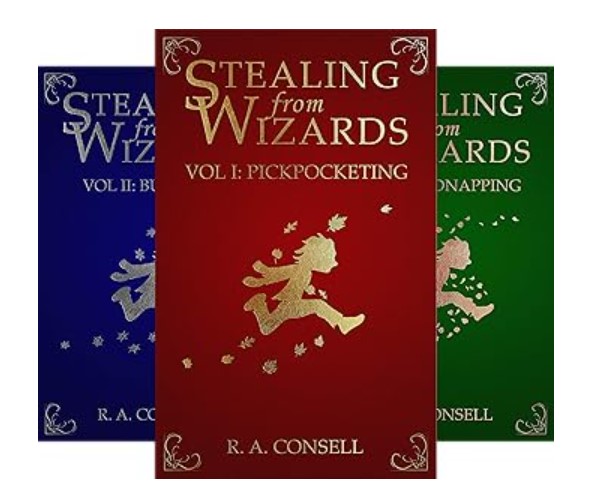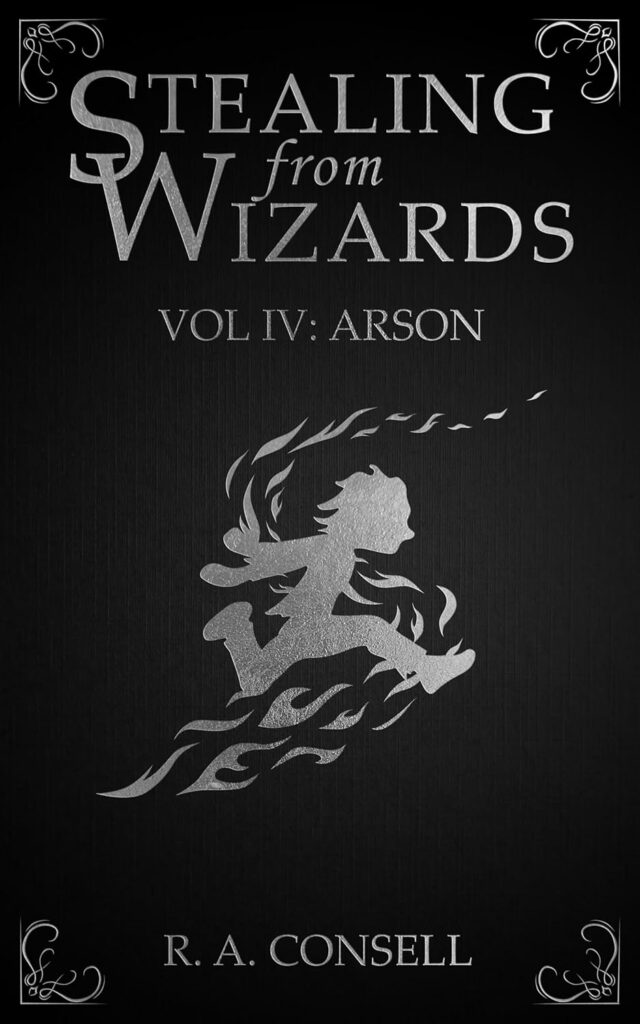After More Than 8 Years, Stealing from Wizards author R.A. Consell Is Considering Canoeing

My son was eight or nine when he discovered Stealing from Wizards for our family. And I do mean our family. One day, while just the two of us are in the car, he asks me to put on a podcast he’s been listening to at night. “It’s a book,” he tells me.
I put it on and the voice of R.A. Consell effortlessly transports me to the magical realm and Detritus Lane, a 10-mile-long road that stretches across the whole of Canada, features buildings from every era of human history (that are often bigger on the inside), and plenty of shadows you can hide in — though you need to take care for the shadows that want to hide in you.
Thus begins the haunting, beautiful, heartwarming, and — yes — funny story of 12-year-old thief Kuro and his magic school classmates. Across three wonderful books, Kuro has slowly come to find his place at Avalon Academy, settling in with one of the oddest, most lovable found families I’ve ever come across, all while being truly horrendous at school and possibly even worse at magic.
After my conversion, we shared the podcast with my wife and daughter, and both of them have listened to and read it pretty obsessively in the time since, even gifting the books to friends from time to time. There was a good year or more over which I’m pretty sure my son listened to the first two books every single night.
Yes, it’s that good.
The Man, the Myth, the Canadian

Who is Consell, the man behind this unexpected delight? I’ll let his pithy Instagram bio tell you:
“Author, academic, scientist, cosplayer, prop maker, podcaster, gamer, nerd. Not necessarily in that order.”
The second I read that, I thought: “Yep, that’s exactly the kind of person who could write Stealing from Wizards.” I highly recommend checking out his social accounts, where he regularly takes pop culture stalwarts (like, say, the Muppets) and attempts to apply rigorous science to them — typically to hilarious effect.
So yes, I was a little bit excited when Ryan agreed to answer some interview questions for me. After writing and cutting and writing and cutting and writing some more, I’m still not sure I came up with the best questions. But if I can let just a few more people know about this amazing series, that’s all I can ask for.
Without further delay, here’s R.A. Consell:
1. For those who haven’t read Stealing from Wizards (SfW), can you share a little about the series and how you came up with the idea?
Stealing from Wizards is a story about magical misfits finding themselves and each other. It centers on Kuro, a street rat pickpocketing his way through the magical fairy realm. He’s caught, arrested, and sent to Avalon Academy, a boarding school for wizards on an island out in the icy waters of Hudson Bay. He falls in with a small collection of oddballs. Magic school adventure ensues.
It started as a conversation around a campfire on a backcountry canoe trip. We were talking about how Percy Jackson was a very American magic school story in the same way that Harry Potter was very English, and we got to speculating what a very Canadian magic school would look like.
After a few days of paddling through the stunning wilderness of northern Ontario with that question rolling around in my head, I had the rough outline of a story. Eight years later, it’s a four-book series.
2. In the books, you explore themes of belonging, identity, ethics, found families, trust, self-acceptance, abuse, and friendship, among others. That’s… a lot. And it’s one of the things that makes them so rich and rewarding. But what do you most hope kids take away from reading SfW?
I think you’ve hit on a principle I had while writing, that there isn’t one single overarching message. I’ve tried to capture what it’s like to be a misfit tween, and it’s messy. There’s joy and laughter, awkwardness and uncertainty, moments of happiness and of sorrow, comedy and catastrophe, a lot of whimsy and a fair bit of petty crime.
If there’s a core takeaway, it’s probably that there is no single right way to be a person. All the characters are trying to figure out who they are and where they belong in the world. None of them come to the same conclusion, and all of them are correct.
3. From my wife: In Harry Potter, the house-elves are portrayed as happy slaves, and Hermione is viewed as a joke for trying to stand up for their rights. Did you have this in mind when creating the lutin?
Stealing from Wizards is a pastiche of folklore and mythology. It’s drawing on old and unrelated stories and weaving them together to make a coherent contemporary setting. I’ve pulled in Canadian folklore, as well as many which have been imported over our colonial history.
Lutin are part of Quebecois folktales, and I really wanted to include them. They play a big role across the series.
The HP house elves are clearly coming from a similar source: French folk stories. It’s unavoidable that many readers would jump to the house elves as a point of comparison. Knowing that, I tried to be thoughtful about making them meaningfully different, while still staying relatively close to the source material.
Regarding the slavery, that entire narrative was baffling to me in HP, and I saw no place for it in my own work. I can imagine a fantasy world with its own forms of villainy without resorting to government-sanctioned chattel slavery.
4. You go to great pains to stay true to Kuro’s well-earned distrustful nature — especially around adults — while subtly making it clear to the reader that he’s got it all wrong and the people he pushes away are almost always trying to help him. Can you talk a bit about that dynamic and finding that balance?
This is going to feel a bit bleak, but that’s something based off of real children I’ve worked with. There are kids out there who have had very tough young lives, who have learned through experience to distrust other people, to view kindness with suspicion, and anger with mortal fear. Some of the writing about Kuro is wishing for a positive path forward for those kids.
5. One of the things that stands out in the series is how every one of your main kid characters has a secret. But the tension isn’t about uncovering it so much as them learning to accept and protect each other. How do you decide when to keep a secret unrevealed and when the story demands it come to light? Are there craft tricks you use to make withheld information feel emotionally satisfying instead of frustrating?
It’s easy to come up with narrative reasons for characters to keep secrets from each other. Secrets are shared only with people you trust when you feel safe and in private. Remove any one of those pieces and a secret stays secret.
Keeping secrets from the reader is more challenging. If we have access to a character’s perspective, then we also assume we have access to their inner life. If a character knows their own secret and won’t share it with the reader, that can be very frustrating.
Stealing from Wizards is written entirely from Kuro’s perspective. The reader only really gets to know what he thinks and perceives, and he’s an unreliable narrator. He’s fully honest and forthcoming with his understanding of the world, but he’s almost always working from incomplete information and is often wrong. So if someone is keeping a secret, he’ll often fail to notice, or misinterpret what that secret might be.
6. My 13-year-old wanted me to ask: Who is your favorite side character — and why?
I think my favourite, despite only appearing in a single chapter in the first book, is Emily Wong, the keeper of the lost and found. She was a delight to write, and gave me a chance to paint a lot of depth and variety in the magical world really early on. She provided another perspective of magic, wizards, and life in the fairy realm, all while being a bit ridiculous and a little snarky.
7. You have a background in materials science and engineering and describe yourself as someone who “overthinks fictional physics.” Can you give an example of where that science background shaped your world-building or magic system?
Oh, absolutely! So, in quantum field theory, we talk about force-carrying particles interacting with various fields. The Higgs boson, for example, is an excitation in the field which gives matter mass. In general relativity, we find that space and time are interwoven and also somewhat flexible; they can be stretched and warped by massive objects, resulting in gravity. Finally, we cannot forget our good friend the mass-energy equivalence, E=mC2, which describes how matter and energy can be transformed from one to another.
For Stealing from Wizards, I postulated another field beyond the standard model, the magical field, and imagined thought as being its own distinct physical phenomenon. The two interact. So, via the magical field, thought can be transformed into energy. Due to mass-energy equivalence, exactly the right thoughts could transform that energy into matter as well. If the magical field had interplay with gravity, that could also bend spacetime to warp the landscape in some excitingly non-Euclidean ways.
All of that is absurd, of course. We’d need nuclear levels of energy to modify matter from one element to another and black holes to warp space like that, but it laid a foundation for how magic works in the series.
Very little of that makes it into the books, though. Most people signed up for whimsical fantasy, not a physics lecture.
8. For educators and librarians: You have a popular (and wonderfully nerdy) social media presence. Do you think social-media content like yours can serve as a “bridge” for reluctant readers — showing that science, stories, and fandom all intersect?
From my observations, it usually goes the other way. Fans of my books are more likely to seek out my social media than the opposite. I hope what they find there is broadly delightful, or at least not too disappointing.
Regarding reluctant readers, I am one. I don’t read many physical novels. I listen to audiobooks while I do my other artwork. Before audiobooks were widely available, I just didn’t engage much with long-form written fiction. I found reading unpleasant. That’s one of the reasons it was so important to me to get the audiobook out there. I wanted to meet kids where they were.
9. As a science and math teacher, how does your classroom experience shape the way you write for MG/YA readers?
I don’t think it’s any coincidence that this series centers around a school. I’ve been an educator of various stripes most of my adult life. I think where that comes out in my writing is in the portrayal of the school and the teachers in it.
There are a lot of books set in schools where I can tell the author has only ever seen them from the student perspective. The lessons are pointless and the teachers flat or cartoonish. Having been on the inside, I enjoy giving the teachers personality and private lives, even if the characters in the book can’t quite parse them.
My teachers are all caricatures of people I’ve worked with, and all include facets of myself, as well. They’re flawed and a bit weird, but are all trying to do the best for their students in their own ways. They have their own stories going on in the background, often inscrutable to their students, but there, nonetheless.
10. I’ve always thought of SfW as an upper middle grade series, but I’m pretty sure I’ve heard you refer to it at times as MG and other times as YA fantasy. Is it your feeling that the series starts middle grade but becomes YA as the characters get older? And how do you think your series fits into the frequently-lamented MG/YA gap?
It really is a bridge series. The characters start at twelve and grow to sixteen. By the numbers, that makes it middle grade at the beginning, sliding into YA by the end. Thematically as well, it’s a bridge. The books grapple with questions of identity throughout, but transition from themes of self-discovery to questions about how they fit into the broader world.
How I talk about it varies a bit, but not because of it being a bridge series. It’s mostly marketing.
“Middle grade” doesn’t mean much to most people. It tells librarians where to shelve it, but most parents don’t know the term, and kids even less so. Even if kids did know it, it doesn’t exactly inspire excitement. Nobody is keen to be “middle grade” and certainly not “tween.” “Young adult” sounds much better, and people are familiar with it, so I often use that when describing the books.
11. How do you view the balance between free platforms/formats like podcasts or Wattpad (both of which you used) and ones that ask readers to pay? What can authors and other creatives learn from your experiences?
The terrible truth is that the landscape is changing so fast, any insight I can give will be obsolete before I put a period on this sentence. But I will try.
First, some context: I didn’t have a grand strategy for my books, no great aspirations or expectations. The first book was just a fun story that I initially shared for free, because I didn’t imagine anyone would want to pay for them. Vociferous demands for paperbacks convinced me otherwise. When book two kind of blew up, I was startled. This was not a carefully architected strategy.
What I did do, in hindsight, was build community.
I am terminally online. I’ve been blogging and posting my artwork on almost every platform that’s existed since about the time it was possible. Over the years, I’ve naturally built up a network of connections. Not cynical business networking nonsense, but a web of friends and colleagues. I have collected a community of diverse and brilliant people who I trust to give honest advice and feedback, who are happy to share my work when I do a good job, and will tell me when I don’t.
12. From my 10-year-old: Do you have any advice for writers?
As it’s from a 10-year-old, I will try to offer advice that they could use as a relatively new writer.
First, try a lot of different modes of writing. Try a short story, a comic book, a Dungeons & Dragons adventure, an epic poem, and a stage play. Figure out what you enjoy and what forms of stories you imagine fit best into. Not every story needs to be a novel, and not every writer works best in that format.
Next, pick projects you can finish. There are a lot of different things to practice in writing. Starting a story and finishing a story are two very different skills. I know many aspiring writers who are very good at the first, and very bad at the second.
Finally, practice getting feedback. At some point, if you share your writing, you will get some pretty negative critiques. My advice is to get used to that by sharing things you know are flawed. That doesn’t even need to be your writing. It can be other art, anything you made that you don’t feel too precious about.
That will help you build up an appreciation for good and helpful critique, and help you to ignore the purely negative stuff. It will also help you learn who are the safe people with whom you can share work you really care about.
13. Somehow, I missed the horrible news that the upcoming fourth book of SfW will be the last one until researching for these questions. One, how can you do this to us? And two, what goes into deciding how long a story world should continue — what tells you the arc is complete?
I’ll take them in order:
One: I am a terrible person and the wails of lament from my fans nourish me.
Two: the story felt complete. My hope is that when you get to the final book, you’ll feel the same way. The whole series has seen escalating threats, but also a steady climb from despair and loneliness into friendship and hope. If I were to escalate beyond the events of Arson (book 4), it would have to get pretty dark, and it’s just not that kind of series. Also, by the end of Arson, the main characters have found community and belonging. It would feel like a betrayal to shatter that just for the sake of another story.
14. Now that SfW is over (at least the writing portion), what plans do you have for more books? (“I don’t” is not an acceptable answer.)
It’s been over eight years from start to finish on this series. I have a few half-formed ideas rolling around, and I’m sure I’ll get back to writing in not too long, but for now I’m going to take a break. I’ll rest, reflect, maybe go on another canoe trip, and see what comes out the other side.
At Least We Don’t Have a Long Wait

While whatever comes next for Consell may take a while, he hasn’t left fans bereft. The fourth and, sadly, final book in SfW comes out in just a few days — November 4. I highly recommend picking up the entire series as soon as you’re able.
Still not completely sold? Try the podcast. It’s free, and it is incredible.
What questions would you like to ask Ryan?
